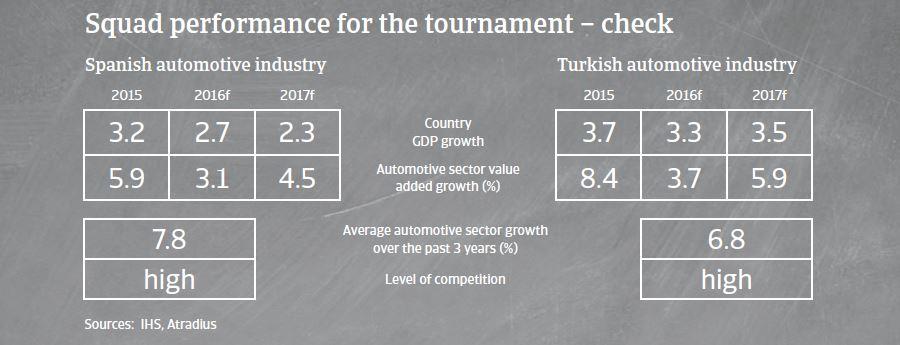Spain remains a heavyweight in the automotive playing field, while the sector faces troubles in Turkey as domestic demand is expected to decrease further.
European football championship 2016
Sector playing field: automotive industry

Spain: a heavyweight in the European automotive playing field
Spain is still the second largest car manufacturer in Europe, behind Germany, and ranks number 9 globally.
In 2015 the Spanish automotive sector recorded a positive performance, as production and capacity utilization returned to pre-crisis levels. Spanish car production increased 12.7%, to more than 2.7 million units, while value increased by 21% to EUR 36.4 million. Automotive exports increased 11.4% by units and 18% by value, to EUR 31.7 million. Automotive is Spain’s second largest export industry with more than 85% of the national production exported. The sector has also benefited from the domestic economic rebound that began in 2014, with new vehicle registrations increasing in 2015.
The positive development carried over into 2016, and is expected to continue in the coming months. Businesses´ profitability have generally increased over the past 12 months, and is expected to continue to grow in 2016.
While external financing requirements and gearing are generally high in this sector, banks are increasingly willing to provide credit to this industry, for both short-term financing (working capital management) and long-term facilities (i.e. capital expenditure financing).
Turkey: some difficulties ahead
Automotive demand in Turkey has started to decrease, as the market contracted 3% year-on-year in the first quarter of 2016. This was mainly due to a more difficult political and economic environment coupled with security issues, all negatively impacting domestic demand. It is expected that automotive demand will remain at lower levels in the second half of 2016.
Despite a favourable raw material costs environment, low flat steel prices, profitability of Turkish car producers and suppliers remained unchanged over the last twelve months. Price wars are common in the market and with lower raw material prices, companies feel more comfortable in cutting prices to try to increase market share. Competition played an important role in the direction of stable bottom-line figures. Businesses´ margins are expected to remain largely unchanged in 2016.
Gearing and financial requirements are average in the Turkish automotive sector. Supplier support, rather than bank finance, is usually sought out in this sector. However, when needed heavy investments are to be funded by bank loans.
Players to watch
Spain

Larger Spanish suppliers/car part producers are performing well and are successful abroad, with very good performance in Europe, Asia and the NAFTA region.

Caution is advised in the Spanish car part supplies producers segment with small- and medium-sized businesses that are highly leveraged.
Turkey

All sectors (automotive manufacturers, suppliers and car part producers, car dealers) are affected by lower sales.
Major strengths and weaknesses

Spanish automotive industry: strengths

Turkish automotive industry: strengths
- Importance to the Spanish economy
- High productivity levels
- High competitiveness of the Spanish automotive components industry
- Skilled workforce and strong commitment to research and development
- Good geographic proximity to main export markets like Europe
- Widespread distribution networks
- A lot of involvement of foreign manufacturers through joint ventures

Spanish automotive industry: weaknesses

Turkish automotive industry: weaknesses
- Increasingly strong competition from emerging economies
- Dependence on external market demand
- Interest rate hikes and foreign exchange risks
- High taxes
- Many businesses are undercapitalised
- Fierce competition in the market
Fair play ranking: payment behaviour and insolvencies
Spanish automotive industry
On average, payments in the Spanish chemicals sector take around 60 days.
Payment experience is good, and the level of protracted payments has been average over the past couple of years.
Non-payment notifications are low, and we do not expect major increases in the coming months due to the positive evolution of the automotive sector.
The level of automotive insolvencies is low, and this is expected to remain unchanged in H2 of 2016.
Turkish automotive industry
Payment duration in the chemicals sector ranges between 30 days and 69 days.
Payment behaviour is generally stable, with non-payment notifications expected not to increase in the coming months.
Automotive insolvencies are low in numbers and are expected to remain stable in the coming six months.
Documentos relacionados

3.18MB PDF

3.02MB PDF
